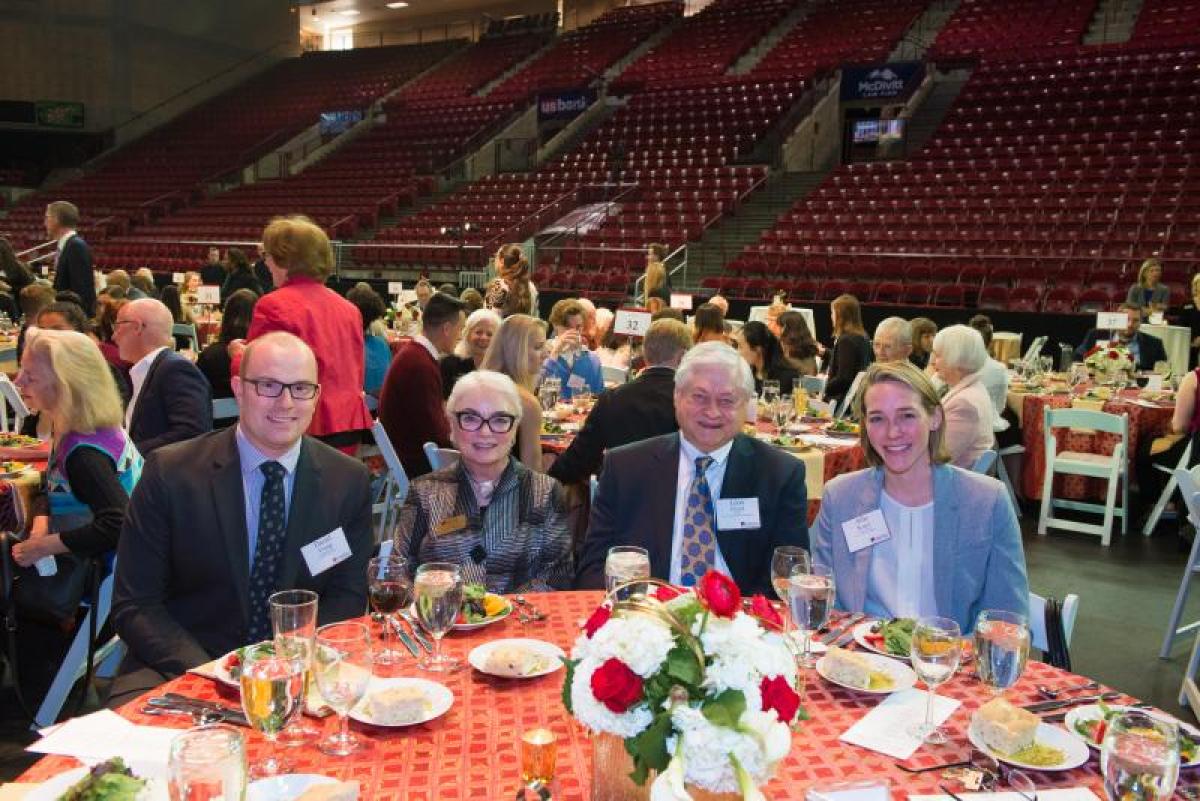Grateful Hearts Dinner Highlights Role of Scholarships in DU Student Success

When Leon Drozd began his studies at the University of Denver College of Law (now the Sturm College of Law) back in 1975, he had already put himself through undergraduate school, saving money from the time he was 16 and working around college classes.
Drozd would face similar hurdles throughout his time at DU, and the experience sticks with him even today. “I worked while I was in law school, and I know what it’s like firsthand to try to plan and pay for school,” he says. “When school is important to you and you’re trying to make something of yourself, the financial part of it can be a real challenge.”
Now a retired lawyer who spent the bulk of his career handling real estate, environmental, business transaction and aviation law for Chevron Corp., Drozd hopes to ease that burden for others. “Now I’m in a position to give something back,” he says. “I can relate to the challenges students are facing, and if I can do something to financially put some wind in their sails, it gives me great satisfaction.”
For the last several years, Drozd has endowed a scholarship through the Sturm College of Law — all in the interest of helping students with both merit and need succeed. This year, Drozd’s scholarship helped Allie Berger through her final year of law school.
The pair met for the first time at this year’s Grateful Hearts Dinner, held in April at DU’s Magness Arena to connect students with the people helping to fund their education. “I think it’s easy to get caught up in just going to school and forget there’s an actual person who is being charitable enough to donate their money so that you can attend school every day,” Berger says. “Meeting him was a really good opportunity to remind myself to be thankful for that.”
After graduation, Berger plans to complete a judicial clerkship and then return to the law firm where she worked as a summer associate. Thanks to Drozd, she’ll do so without the burden of high student loans. “It means more freedom in all areas of my life. Just having less debt in my mid-20s gives me a lot more flexibility to make other investments and really think about becoming more involved in the law school as I become an alumna.”
Berger is just one of hundreds of students who receive endowed or gift scholarships each year. According to Lory-Ann Varela, director of access and transitions at DU, many others find financial assistance from new and longstanding programs, such as DU’s Denver Promise Scholars and Volunteers In Partnership (VIP).
In its first year, the Denver Promise Scholars program awarded $10,000 each to 20 students from the Denver metro area. The program’s four-year leadership-development model ensures that the scholars receive far more than just financial support.
“If we’ve done our job right, they have an opportunity to plan out internships, work on career development, receive academic coaching and have financial planning, so when they leave, they have a vision of what they want to do and the experience which helps them,” Varela says.
Much like the Denver Promise Scholars program, VIP, created in 1990, is built on partnership with the Denver community. The program, overseen by Linda Quintanar, director of first-generation initiatives at DU, works with nine high schools, offering support not just for students, but for parents and families as well.
Students applying to DU from partner schools not only get help navigating FAFSA forms and the financial aid process, but also have their application fees waived. Should they decide to enroll at DU, their deposits are waived as well, and they receive a VIP tuition scholarship and a $150 scholarship each quarter for purchasing textbooks. In return, they commit to the volunteer component of the VIP program, returning to their high schools to continue the access pipeline. Today, the VIP program helps more than 100 DU students.
“The financial burden is a big worry for families and students,” Quintanar says, adding that financial support relieves stress and allows students to focus and succeed.
Varela feels the same: “If [a student’s family] doesn’t have the capital already stored, they are going into debt. What it means for students when they graduate is … they are paying student loans and that’s absorbing so much of their income. That dictates the choices of what they want to do as a career and they have to make decisions not on love or best fit, but on financial necessity.”
Bringing that access to students who might otherwise consider DU unaffordable is crucial for the entire community, she says. “We have a commitment to creating a very diverse learning environment where people are being exposed to different life experiences, different geographic experiences, different cultural experiences,” Varela says. “When we start to omit people from that group, we lose a valuable perspective that enriches everyone and the way they are thinking, learning and growing.”







